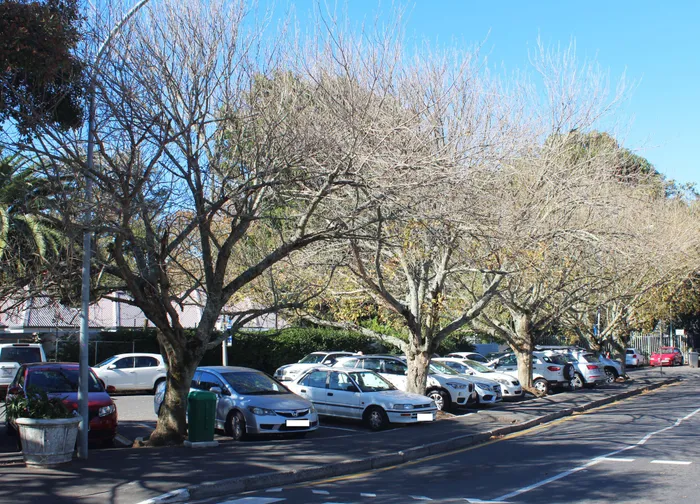Newlands trees fall prey to invasive beetle

Six trees on the corner of Kildare Road and Main Street, Newlands, will be removed by the City as they have been infested with the polyphagous shot hole borer beetle.
The City is to clear six public trees from a Newlands parking lot after they fell prey to an invasive tree-killing beetle.
Ward councillor Mikhail Manuel says he was alerted in December last year that the boxelders on the corner of Kildare Road and Main Street were dying.
It was later confirmed that the trees were infested with the polyphagous shot hole borer beetle.
The trees are to removed by the City’s invasive species unit on Monday May 20.
“We have to remove the trees carefully to avoid any further contamination to other trees,” said Mr Manuel, adding that while trees were a key part of the area’s character, the City planned to replace them.
Mayoral committee member for spatial planning and the environment Eddie Andrews said removing the trees was the only effective way to manage the infestation.
The beetle, he said, posed a “serious threat” to Cape Town’s urban forest as infested trees had to be chipped.
Cracks on branches, discoloured leaves, goo seeping from bark, small holes the size of sesame seeds and dark stains were all signs of possible infestation that the public should be on the lookout for, he said.
The six boxelders were heavily infested and posed a high risk to surrounding trees, including maples and poplars, he said.
According to Clare Burgess, the chairperson of TreeKeepers, which is a non-profit that promotes the conservation of urban trees, the beetle has an associated fungus, which it carries into the trees through living bark and deposits there for its offspring to feed off.
Removing infested trees would lessen the impact of the beetle’s spread, but it would not stop it completely, she said.
“There will be many trees on private property that will become infected, and in these areas it will be up to the owners to remove the trees.”
Newlands Resident’s Association chairperson March Turnbull said they were devastated to be losing trees. “They aren’t the only trees to be lost, some trees on public and private property have also been lost; it's a complicated issue. We are committed to replanting suitable tree species,” he said.
According to the latest City statistics, 380 sightings of infested trees have been recorded in Newlands, Rondebosch, Mowbray, Claremont, Kenilworth, Observatory and along the Liesbeek River and Alphen-Constantia.
There are several precautions the public can take to prevent the spread of the beetle:
• Chip the tree, or if this is not possible, cut the wood into smaller pieces that can be placed in refuse bags. Seal all infested material in refuse bags and put these in direct sunlight for at least six weeks in summer and up to six months in winter.
• Dump the chips in your compost heap as the heat build-up will kill the beetle.
• Burn infected wood chips at appropriate incineration facilities.
• Seek assistance from trained and equipped service providers with sound knowledge of the beetle.
• Do not move plant/tree material/firewood outside of areas where the beetle has been confirmed to be present.
• Do not transport any form of green waste in open vehicles; cover it with sail covers.
• Clean tools and equipment used to trim/cut/prune plants.
To report beetle sightings, visit the City’s website or contact the invasive species unit at 021 444 2357 or invasive.species@capetown.gov.za.

Related Topics: